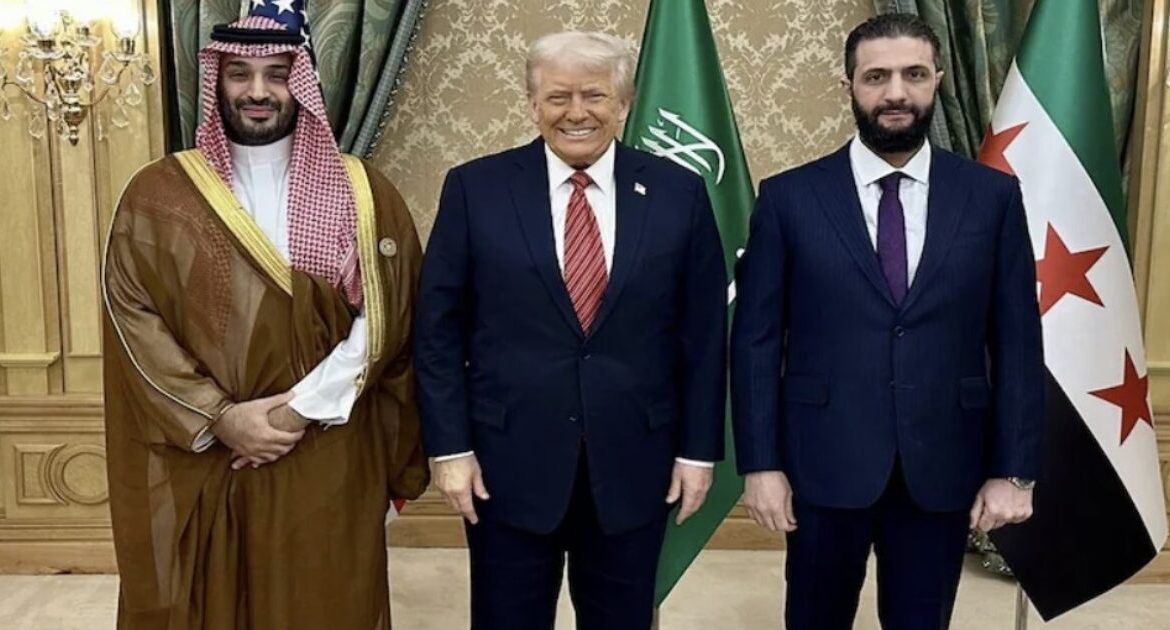

Qatar offered to give the Trump White House an airplane they had bought from America, and liberals called it a bribe. On the same trip, they entered into discussions over $1.2 trillion in commercial and defense deals that will benefit the U.S. That is the exact opposite of a bribe.
President Trump’s four-day tour of the Middle East, covering Saudi Arabia, Qatar, and the United Arab Emirates—was a clear success. It yielded over $2 trillion in new investment and reinvigorated U.S. diplomatic influence in the region. In addition to securing economic benefits, Trump opened preliminary discussions with Iran on limiting its nuclear program and claimed some progress toward ending the war in Ukraine.
He also became the first U.S. president in more than 25 years to hold a face-to-face meeting with the Syrian head of state and announced that sanctions on Syria would be lifted, a move later clarified by Secretary of State Marco Rubio as a temporary waiver.
Lifting sanctions on Syria was one of the most controversial outcomes of the trip. The current ruling authority, Hay’at Tahrir al-Sham (HTS), under President Ahmed al-Sharaa, seized control by ousting Bashar al-Assad and now governs through authoritarian rule. The group enforces strict Sharia law, suppresses dissent, and maintains deep roots in jihadist networks formerly aligned with al-Qaeda. HTS is designated as a terrorist organization by the United States and is not recognized by the U.S., the U.N., or most Western governments. Critics argue that removing sanctions contradicts decades of U.S. foreign policy and legitimizes a brutal, fundamentalist regime.
Despite the backlash, Trump’s decision reflects the core principles of his foreign policy approach: direct engagement, transactional leverage, and a willingness to bypass traditional diplomacy in favor of strategic gain. Often referred to as the Trump Doctrine, this style emphasizes dealmaking over ideology, prioritizing U.S. interests through bold moves that sidestep established norms. The announcement came just as Hamas released Edan Alexander, the last known American hostage, and Trump’s envoys met with him and other freed captives, suggesting that sanctions relief may have served as diplomatic leverage.
In Syria, his objective appears to be strategic realignment, pulling the country away from Iranian and Russian influence. From a geopolitical standpoint, a U.S.-aligned authoritarian regime is more advantageous than a hostile one backed by America’s adversaries.
In Saudi Arabia, Trump met with Crown Prince Mohammed bin Salman and secured $600 billion in strategic investment deals, along with a $142 billion arms agreement, the largest ever signed. U.S. firms were selected for major infrastructure projects, including King Salman International Airport, as well as key defense initiatives. The deals strengthened military cooperation and delivered a significant boost to American industry.
Trump met with Emir Tamim bin Hamad Al Thani in Qatar, where the two finalized a $1.2 trillion economic exchange that included a record-setting order of 210 Boeing jets and expanded defense procurement. A Qatari royal also offered a luxury Boeing 747-8, valued at approximately $400 million, for temporary use by the U.S. Department of Defense as Air Force One, prompting political criticism. Trump emphasized that the aircraft was not a personal gift but a gesture to assist the United States, stating it would eventually be transferred to his presidential library. Despite the controversy, the agreements delivered significant benefits to American manufacturers and defense contractors.
The investment forums Trump hosted in Riyadh and Abu Dhabi drew top U.S. business leaders, including Elon Musk, Nvidia CEO Jensen Huang, and BlackRock’s Larry Fink, signaling that major American companies are prepared to take part in the investment deals pledged by the Gulf states.
His final stop in the UAE produced one of the most forward-looking agreements of the tour. He met President Mohamed bin Zayed Al Nahyan, and the two countries reaffirmed a $1.4 trillion, ten-year investment framework targeting artificial intelligence and advanced technology. They also agreed to build a massive AI data center in Abu Dhabi. In recognition of the strengthened ties, Trump received the Order of Zayed, the UAE’s highest civilian honor. Emirati officials confirmed that the U.S. will allow the UAE to import 500,000 Nvidia H100 AI chips annually, marking the first such agreement and solidifying a critical technological partnership.
Trump’s personal diplomacy and dealmaking also extended to broader strategic and military decisions. The seven-week U.S. air campaign against Houthi militants in Yemen, launched in March 2025, was quietly wound down in early May after Trump assessed the operation’s diminishing returns and saw an opportunity for a ceasefire. His willingness to adapt and pull back when conditions change is a hallmark of his foreign policy doctrine.
Once again, Prsident Trump put American interests first, securing major economic deals for the U.S. while avoiding the entanglement of American troops in new foreign wars.
By contrast, Biden’s Middle East strategy resulted in gas prices doubling, billions of dollars in U.S. weapons falling into Taliban hands, Hamas invading Israel, Houthi attacks on ships in the Red Sea, and Hezbollah and Iran raising their ugly heads. And yet, the media barely reported on Trump’s wins in the Middle East, while liberals and Democrats continue to call him a failure.
The post Trump Secures Trillions and Strategic Wins in the Middle East appeared first on The Gateway Pundit.

